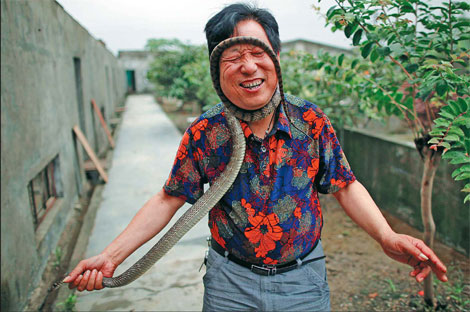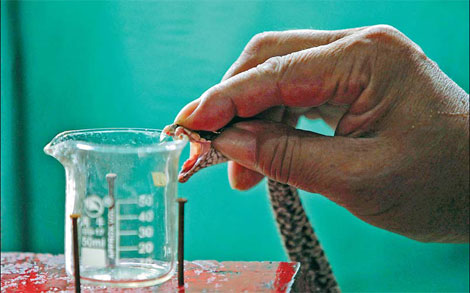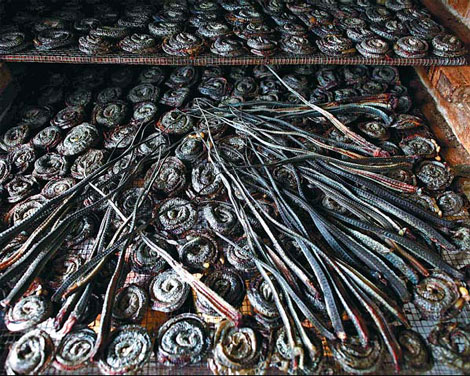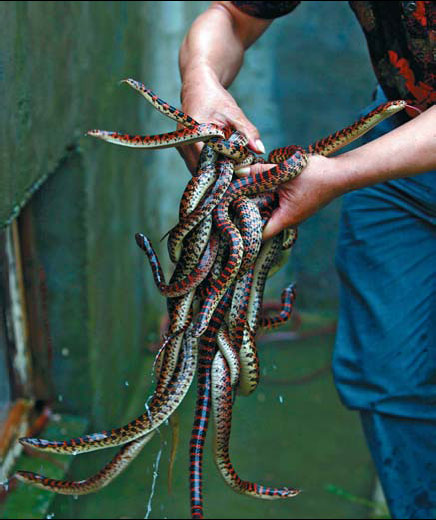Dangerous Liaisons
Updated: 2011-08-07 10:17
By Royston Chan and Aly Song (China Daily)
|
|||||||||||
You can encounter cobras, vipers and pythons everywhere in Zisiqiao, aptly known as snake village.
ZISIQIAO VILLAGE - This sleepy village nestled in the heart of vast farmland in China's eastern Zhejiang province hides a deadly secret.
A step into the homes of any of the farming families here brings visitors eye-to-eye with thousands of some of the world's most feared creatures - snakes, many of them poisonous.
 |
|
"As the number one snake village in China, it's impossible for us to raise only one kind of snake," says Yang Hongchang, the farmer who turned snakes into a village industry decades ago. [Photos by Aly Song / Reuters] |
Deliberately raised for use as food and in traditional medicine, the reptiles bring in millions of dollars to a village that otherwise would rely solely on farming.
"We are researching many kinds of snakes and the methods of breeding them," said Yang Hong-chang, the 60-year-old farmer who introduced snake breeding to the village decades ago.
In 1985, Yang started selling snakes he caught around the area to animal vendors. He soon began to worry that the wild snakes would become extinct and thus began researching on how to breed snakes at home.
Within three years, he had made a fortune - and many other villagers decided to emulate his success.
Today, more than 3 million snakes are bred in the village every year by the 160 farming families.
Snakes are renowned for their medicinal properties in traditional Chinese medicine and are commonly drunk as soup or wine to boost immunity.
 |
|
Yang Hongchang extracts venom from a snake, one of many valuable products the creatures provide. [Photos by Aly Song / Reuters] |
Yang has now started his own company to make his business more formal and build a brand, and also to conduct research and development for his products, which range from dried snake to snake wine and snake powder.
The original breeding method was simply putting males and females together, but now meticulous research is done on how the snakes breed, how to select good females, investigation into their diet, and how to incubate eggs so survival rates rise.
Yang says snake products from the village are currently being exported around the globe.
Closer to home, snake products from the village are sold in the bustling Zhejiang city of Hangzhou, where the Hangzhou Woai Company offers snake powders and similar goods.
"Each part of the snake is treasured," said store manager Gao Chenchang.
"China has a strong snake culture, there are a lot of people - like in Guangzhou -who like to eat snakes."
But rearing the snakes comes with obvious risks.
Yang Wenfu, 55, gave up rearing species of venomous vipers after being bitten by one of them earlier in his career.
"Life is valuable and making money is secondary."
 |
|
Snake carcasses are left to air-dry so they can be made into medicines. [Photos by Aly Song / Reuters] |
 |
|
Dead snakes are preserved in jars for future use in medicines. [Photos by Aly Song / Reuters] |
 |
|
Snakes at the farm are sold to food vendors in Guangdong. [Photos by Aly Song / Reuters] |
Reuters